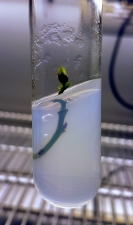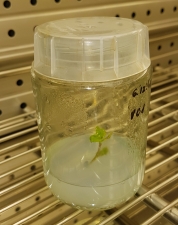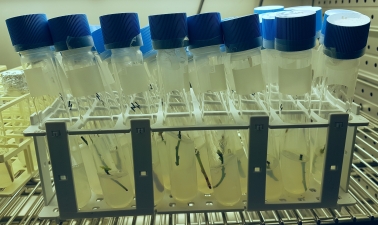



Development and characterization of genome-edited blueberry (Vaccinium corymbosum L.) cultures for production of high-value secondary metabolites

|

|

|

|
Plants naturally produce secondary metabolites used in medicine, nutrition and as industrial precursors. Harvesting chemical compounds from wild or cultivated plants comes with a high environmental impact, depends on seasonal availability and, in the case of endangered species, may not be feasible. Biotechnological solutions, such as plant tissue cultures can provide the required plant material, if appropriate culture techniques are used and metabolite levels are sufficiently high. Blueberry (Vaccinium corymbosum L.) is a woody perennial crop species rich in anthocyanins, resveratrol and lutein with established tissue culture and Agrobacterium-mediated transformation protocols, but lacking genome-editing protocols. This project aims to develop CRISPR/Cas system to edit blueberry genome for specific genes to redirect flux of precursors towards specific secondary metabolites of interest. To achieve this aim, we propose 1) to use genome-scale and pathway-specific metabolic modelling to identify target genes for editing; 2) to adapt existing protocols for blueberry tissue cultures; 3) to develop workable DNA-free and Agrobacterium-mediated protocols for CRISPR/Cas-mediated genome-editing in blueberry; 5) to monitor levels of target compounds, their precursors and major competing metabolites using LC-MS. Overall, the project will contribute to the Latvian RIS3 investment priorities 1) high added value products and 2) productive innovation system, as well as to RIS3 knowledge specialization areas 1) knowledge-intensive bio-economics and 3) bio-pharmacy and biotechnologies. Additionally, it aligns with the National research priorities, and will strengthen the leading role of University of Latvia in the field of agricultural biotechnology. The major outcome will be proof-of-principle for establishing of genome-edited blueberry tissue cultures that produce target metabolites, as well as improved understanding of biochemical pathways leading to production of key high-value metabolites. Project results will be disseminated in the form of research papers in peer-reviewed journals, at research conferences and to the general public.